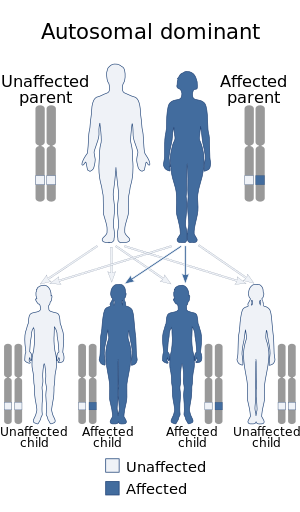Von Willebrand disease
Von Willebrand disease (or VWD) is an inherited condition where blood does not clot properly, so it causes people to bleed more easily. There's no cure but most people have mild symptoms that can be managed.[1]
| von Willebrand disease | |
|---|---|
 | |
| von Willebrand disease types I and II are inherited in an autosomal dominant pattern. | |
| Pronunciation | |
| Medical specialty | Hematology |
Symptoms
changeVon Willebrand disease does not always cause symptoms unless there is an injury. Sometimes it is found when someone has more bleeding than usual after surgery or giving birth.[1]
Symptoms of von Willebrand disease can include:[1]
- bruising easily
- frequent nosebleeds
- bleeding gums
- bleeding more than usual after an injury or cut
- heavy periods
Some people also have more severe symptoms, such as:[1]
Causes
changeVon Willebrand disease is nearly always caused by genes inherited from parents.[1]
The most severe type of von Willebrand disease, called type 3, happens when a child inherits the gene from both parents. For type 1 or type 2, there's a 1 in 2 chance that future children will also inherit it.[1]
In type 3, the children will also have von Willebrand disease, but they'll usually have type 1 or type 2, with less severe symptoms.[1]
In very rare cases von Willebrand disease can be caused by other conditions that affect the blood, such as heart problems or blood cancer, or by taking certain medicines.[1]
Treatment
changeTreatment for von Willebrand disease depends on both the type and how severe symptoms are.[1]
Usually someone use first aid to treat less serious bleeding themselves, such as cuts and grazes or nosebleeds.[1] Teaching other people minor first aid might also help just in case the bleeding causing syncope or long loss of consciousness.
If it is type 1 or type 2 and it is causing mild symptoms then someone will only need treatment when they get more serious bleeding, or to help prevent bleeding, for example before surgery or dental treatment.[1]
In type 3 or for more severe symptoms there may also be a need for regular treatment to help prevent bleeding.[1]
To treat or prevent bleeding, treatments may be offered, such as:[1]
- tranexamic acid, usually taken as tablets
- desmopressin, taken as an injection, through a drip into a vein (infusion), or as a nasal spray – this medicine does not work for everyone, so there will need to be a trial first to see if it will help symptoms
- a treatment to help the blood clot called factor replacement therapy, given through a drip into a vein (infusion) – this is used for more severe symptoms
If it is causing heavy periods a care team will usually recommend:[1]
- hormonal contraceptives that can make periods lighter, such as the combined pill or intrauterine system (IUS)
- tranexamic acid